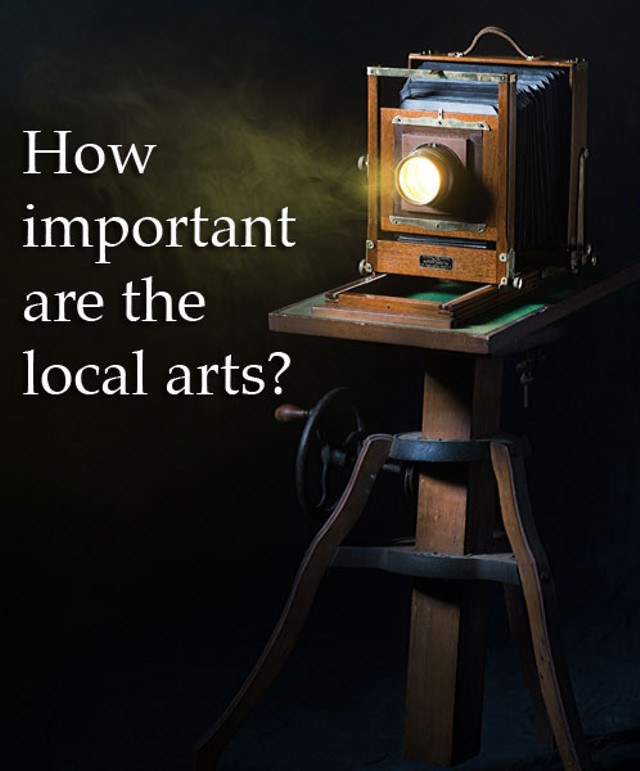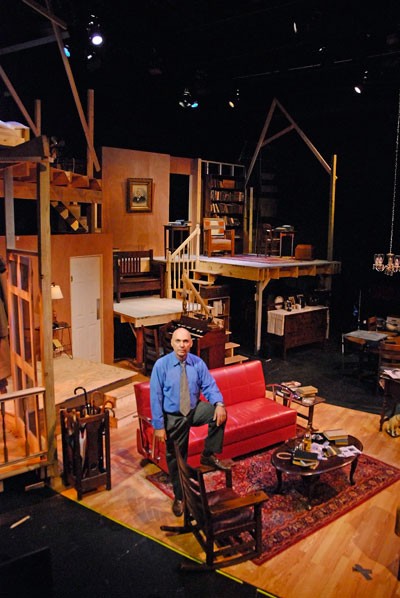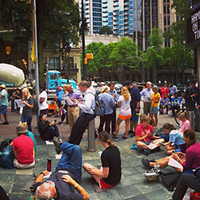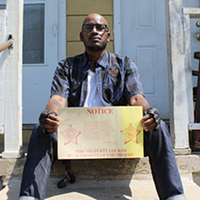The death of CAST
What really happened to Charlotte's beloved experimental theater company?
By Perry TannenbaumWhen Carolina Actors Studio Theatre was at the top of its game, the company didn't merely produce great theater — it produced astonishing theater. Tucked into a Plaza-Midwood warehouse on Clement Avenue with a roof that leaked, CAST had the audacity to produce Omnium Gatherum with a revolving stage. Company members not only built a swimming pool with their bare hands for Metamorphoses in 2009, they engineered it so that the mythological heroes and gods could make underwater entrances and exits.
CAST co-founder Michael R. Simmons didn't simply want you to watch his productions; he wanted to immerse you in them. It wasn't enough for us to see the Marquis de Sade reigning over a phantasmagoric mob of insane inmates in Marat/Sade; Simmons wanted us to feel like we were in the asylum with them.
Every CAST production featured a radical makeover of the lobby, the restrooms, the ushers' costumes, the ticket booth and even the tickets themselves — they could be anything from a driver's license to a bullet casing — fulfilling Simmons' mission of delivering experiential theater. When CAST moved to its new space in NoDa in 2011, the company seemed headed for regional prominence and national renown.
But you've noticed: I'm speaking of CAST in the past tense. It's gone now.
The relocation was supposed to be a new lease on life at 2424 N. Davidson St. Like their Clement Avenue location, Simmons and his son Robert upfitted the suite so that it boasted two theaters, one with a thrust stage and the other with an arena setup. Not content to do things halfway, Simmons & Son again installed a bar in the lobby, one that was better than any bar you'll find in an Uptown theater, outfitted with four draft taps running craft beer from NoDa Brewing across the street.
The new place opened with an awesome blockbuster, August: Osage County, boasting a three-level home — plus an attic — that eclipsed the quality of the towering set I saw on Broadway. With a sensational cast and a Native American-themed lobby, August: Osage keynoted a sensationally successful first season in NoDa. Audiences were robust, and CAST's extra theater — plus a vast rehearsal room — provided a steady stream of rental income from outside companies drawn by the fresh new vibe.
While nothing quite matched the three-hour August: Osage for power and ambition, the hits kept coming in the 2012-13 season, including Lombardi, Bengal Tiger at the Baghdad Zoo, 33 Variations, Frost/Nixon, and most spectacular of all, The Elaborate Entrance of Chad Deity. If the 2013-14 season was laid out as if it were all a grand prelude to the well-publicized return of Angels in America, with less familiar or flamboyant titles, there was no decline in artistic excellence in Reasons to Be Pretty, The Other Place, The Last Days of Judas Iscariot and O Guru, Guru, Guru.
Six days after Angels closed, after disappointing box office receipts, CAST's board of directors announced that the company would close as well. The suddenness of this action, without even an SOS distress signal sent out by the board, was absolutely shocking.
Until its final hours, we'd seen little indication that CAST was in turmoil. Two days before the board's announcement came out in an embargoed press release, CAST sent out a release announcing what would turn out to be its final production, the aptly titled Gruesome Playground Injuries. Appended to the customary hype and details, there was some sunny fundraising info: A new "Look How Far We've Come Campaign" had "already raised $25,100!" toward its goal of $75,000.
Yet the June 6 announcement claimed that "Financial strains on the organization caused the theatre's board of directors to reluctantly but realistically determine that it could not support another operating season." Board member Charles LaBorde, who had co-directed Angels, drew the unhappy assignment of relaying the announcement to the opening night audience for Gruesome Playground Injuries five hours after the embargo was lifted.
The circumstances were eerily similar to the 2005 suicide of Charlotte Repertory Theatre: Productions of Angels in America proved to be a turning point for both companies; 2424 N. Davidson St. was the final address for both companies' administrative offices; no SOS had been sent out to alert the community that the company was near financial collapse; and instead, both companies sent out rosy press releases days before they expired,
So what really happened to CAST? Was there really no alternative to euthanizing a company that had achieved so much over its 22-year history?
Questions about how CAST's demeanor could turn from upbeat optimism to abject defeat within less than 43 hours had to be funneled to Lisa Walker, the board's development and outreach committee chair. When we submitted an interview request to Dee Abdullah, the board member who had co-founded CAST with Simmons, she informed us that she had signed a nondisclosure agreement discouraging her from speaking to the media until after the CAST board had dissolved.
Even Simmons himself was reticent. By the time the news of CAST's closing had gone public, the former airline pilot was out in Phoenix, Arizona, training for his new job at USAir. When we finally spoke, he vented passionately, but off the record. That conversation was allowed to go back on the record after Simmons realized that this story would run after his company's official June 30 closing date — and after the board locked him out of his own theater and insisted that two board members escort him on his final visit to 2424 N. Davidson on June 27.
Meanwhile, Walker did an interview for a news report on WFAE that somewhat modified the previous sketch of CAST's finances. "It's not a matter of we're drowning under debt," she told correspondent Tasnim Shamma. "It's a matter of we don't have enough income year over year to manage to sustain. We've eaten away at any sort of resources that we have in that regard."
Nobler in the Mind
The CAST board couldn't have chosen a more able spokesperson. Walker accepted my request to speak with her by phone on the company's final afternoon, only objecting to my description of the closure as "sudden." What I feared might devolve into a combative conversation, as I pressed for answers about why the board felt their suicidal action was necessary, turned out to be quite cordial.
"When we realized the ticket sales were so slow," she said, looking back on the season, "we did trim back production budgets, and Michael and his artistic team did a great job of dealing with bare-bones budgets."
But after the "amazing success" of their first year in NoDa, Walker said, "things started to level off and then taper off in terms of both ticket sales and contributed revenue. We've tried a number of different things to try to fix those situations. So I can't say there's a single thing, but obviously at the end of the day, a nonprofit like this is not going to make it because we don't have enough money coming in the door."
As for Simmons' charge, echoed to me by two former board members, that the board had not met their fundraising responsibilities, Walker wouldn't respond to anything she hadn't heard directly. Instead, she cited numerous Power2Give campaigns that the board had initiated through the ASC, peer-to-peer campaigns undertaken by individual board members, and the Look How Far We've Come Campaign tied to Angels.
The board had considered making their plea for funds more urgent, Walker asserted, but didn't see an SOS as the solution to "an ongoing and chronic problem." CAST would be facing the same dire prospects in a matter of a few months, six months, or perhaps a year if it managed to cut expenses.
Like Rep's founder and artistic director, Steve Umberger, Simmons had no say in the matter. Although the CAST board wrested control of the company from Simmons and shut it down, Walker convinced me that there was a fundamental difference between this action and the actions that Charlotte Rep's board had taken on its reckless path to self-destruction. Rep's board had fired their company's founder, Umberger, and the company's most successful promoter, managing director Keith Martin, and replaced them with new leadership, Michael Bush and Matt Olin, who both had Broadway connections.
Then Rep's new leadership steered Rep's mission toward achieving national prominence and winning a Tony Award. All of CAST's board members, Walker assured me, believed in Simmons and supported his vision until the very end. "We're here because we believe in this organization. That doesn't mean that we don't have some responsibility. As a [nonprofit] 501(c)(3), we are basically agreeing to making sure that we are taking donations and giving people tax deductions in good faith. And there came a point when we couldn't do that anymore."
There's the Rub
Simmons maintained that he was making significant headway in solving his company's woes. But his pleas for more time fell on deaf ears: "One of the possibilities that emerged from the consultant we had hired was, well, let's talk about doing a merger. That was summarily dismissed: 'Oh, no one would ever want to merge with us.' Well, wait a minute, this was supposed to be like a due diligence."
Michael Ford, owner of UpStage, could have provided CAST with the income stream that the board had claimed was needed to save the company and was nowhere to be found. Since reinventing the former Wine Up nearly two years ago, Ford had opened his doors — and steep staircase — at 3306C N. Davidson St. to the most promising fringe theater groups in town. A week before the board took its vote, Ford had contacted Simmons and arranged a business lunch.
He had heard about the turmoil at CAST. "When we first got to the restaurant. I said, 'I'm worried about you, I'm worried about CAST, but also, my calendar is getting full, and I'm starting to look around for alternatives.'" UpStage was already over 80 percent booked for the next 18 months, and Ford wanted to explore the possibility of renting space at CAST — if CAST was still in business and Simmons was still the right man to talk to.
Simmons had taken the recommendations that nonprofit consultant Kathy Ridge had offered to the board to heart, which included bolstering fundraising and seeking out new partnerships. He was planning to sound Ford on the possibility of a partnership or a merger that would join NoDa's two pre-eminent theater producers.
But when it came time for the men to sit down for their lunch, Simmons had to report that his plan had gone up in flames. Earlier that morning, the board had voted to shut CAST down.
Walker seemed to have difficulty grasping that a lifeline had been offered to the company in its final hours, trying to steer the conversation to negotiations that were currently in progress between CAST and Ford — and the building owner — about wriggling out of their lease at 2424 N. Davidson and getting Ford in. The fact that Ford might have come to CAST's rescue before it folded came as news to her.
"It was not something that was presented to the board by either of the Michaels," she said. "We can't act on things we have not heard about."
Perhaps a bit of tiptoeing there, but she took the high road, skirting any mention of turmoil or friction within CAST and making Simmons sound, by comparison, like Captain Queeg spouting his delusional "they thwarted me at every turn" rant. Only when cross-questioned did Walker reluctantly concede that fundraising wasn't the strongest of former executive director Crystal Dempsey's qualifications when they hired her, but she grew philosophical at that point.
"There's a lot of guilt and probably blame to go around. So certainly the board could have done more. Everybody could have done more. I mean, at the end of the day, the community could have done more, everybody could have done more. So is that part of it? Yes. It's part of it."
So I was buying everything that Walker said. Until I spoke with Ryan Deal, the Arts & Science Council liaison with CAST, and double-checked my other transcripts.
Take our poll: How often do you support the local arts with your attendance?
Slings and Arrows
My phone conversation with Dempsey had taken place a week before I spoke with Walker. CAST's closing had left her saddened but not surprised. Before officially taking over last summer as executive director, Dempsey had begun to learn the ropes at CAST as an independent contractor. She directed publicity and day-to-day operations at CAST, and had a ringside seat to the infighting between Simmons and the board — always over money.
Dempsey confirmed that CAST's financial collapse didn't come suddenly. From what she knew, board members didn't merely pay lip-service to the company's mission — they wrote checks. A couple had even balanced the previous year's budget at the last minute. Until March 5, her last day, Dempsey could vouch for those checks still coming in.
So did ticket revenues, Dempsey maintained, disputing Walker's contention that box office anemia was one of CAST's fatal woes. "My understanding was that we were only $10,000 under our expected ticket sales goal," Dempsey said. "I felt pretty OK with that number, but I don't know where it landed after I left. I'm sure they met that goal."
With good reason. Angels in America would only have had to draw an average audience of 30 people per performance, including the 168 season ticket-holders, to pull in that remaining $10,000 — less than the crowds I saw before the positive reviews came out. And that's not even counting ticket revenues from the two shows CAST staged between the time Dempsey left and Angels opened, strong productions of Reasons to Be Pretty and Judas Iscariot.
"CAST had a great pride in paying the actors and paying the crews," Dempsey recalled, "but I worked on my own laptop, I used my own cellphone. They didn't have the infrastructure that an organization that size usually has."
The flimsy CAST infrastructure and the absence of cash reserves were likely key reasons why most of Dempsey's grant applications were turned down. Despite the widespread acclaim that CAST had garnered in recent years — including best theater accolades from the Loaf, Charlotte Magazine and the Metrolina Theatre Association — the Arts & Science Council retained a cautious funding posture.
Yet ASC support to CAST had grown from $11,300 to $43,367 annually since the 2009 fiscal year. That includes matching funds contributed to eight Power2Give campaigns, which raised an additional $13,390 this past season. In the last two years, CAST's status had been upgraded so that it qualified for basic operating grant (BOG) money, which increased from $15,000 to $25,000 for the year just concluded. From 2011 onward, CAST also qualified for numerous technical assistance grants.
You don't apply for those BOG funds without submitting to a thorough audit, but ASC's Deal says there was no indication that CAST was in trouble until January.
"Michael [Simmons] and Crystal Dempsey and a contingent of board representation came into the ASC office to share with us that they had some substantial financial concerns about the remainder of the last fiscal year, plus how operations were going to look for fiscal year [20]15." They brought a written plan detailing how they would raise $50,000 through donations from individuals and corporate sponsors tied to their production of Angels in America.
It wasn't the freshest idea the ASC had ever heard of: CAST had already run three Angels-themed Power2Give campaigns over the past two seasons, raising $21,000, including matching funds from the ASC. Nor did CAST exactly spring into action with their plan.
That Sleep of Death
Deal didn't hear anything more from CAST about its plan until April. A request came in for a matching grant to engage fundraising specialists Next Stage Consulting, in order to build out what eventually became the Look How Far We've Come campaign.
"So there's not a whole lot of time between the time when that grant request came in and was awarded, Next Stage Consulting was engaged, and the end of June," said Deal.
Without sounding an SOS, the fundraiser tallied $25,100 through the beginning of June, and Walker went on record saying that number had actually been reached by early May. So when a modicum of non-ASC fundraising was actually attempted, CAST had enough clout to bring in monies at a rate that amounted to between $150,000 and $300,000 a year — if CAST's board and staff had sustained the effort for 365 days instead of 30.
What really looks bad after Walker's pious statement about honoring the good faith of tax-deductible donations is the fact that CAST's board had already betrayed that good faith. It was Deal's understanding that CAST had flipped its Look How Far We've Come campaign and turned it into their Tribute Campaign to close the company down.
That wasn't all. Besides the $2,500 tech grant that they received toward Next Stage Consulting's help, and an additional $3,150 grant that they frittered away on consultation services, the CAST board accepted an additional $5,000 technical grant from the ASC "to support legal fees associated with the formal dissolution of Carolina Actors Studio Theatre."
Simmons was so ardent about keeping CAST alive that he offered to resign — or even better, to work for the entire year with no salary. "Our consultant even said, 'Your problem is not expenses. Your problem is the failure to raise funds.' We had a budget. This is how many people we said would come, and we made that budget," Simmons said. "I said this is how much money we'll spend. I came in at or under budget for every show. There are as many different ways to keep this theater alive as there are ideas in the universe. And the one that got explored was close the theater."
There was plenty of drama offstage at CAST. Simmons admitted that he didn't get along with Dempsey and, according to all accounts, there was a verbal altercation between Dempsey and Robert Simmons — on the night of a performance — that resulted in the board banning Robert from the theater. There was constant pressure on Simmons to cut costs before his budgets were vindicated, there were questions about his play choices, and he was even chided for aspiring to achieve the stature of the famed Actor's Theatre of Louisville.
Dempsey said there was stubbornness and intransigence on both sides, preventing necessary agreements and actions from getting done. Lack of progress was what caused Dempsey to resign, and her only regret was that she hadn't concentrated more on fundraising.
Although Walker acknowledged the tense conversation between "some individuals on the board" and Simmons, she claims that there was never any serious antagonism at CAST. Yet the board pulled the plug on CAST under financial conditions that were not impossible, and then they locked the founder they were charged to support out of his own theater.
Members of the CAST board have not provided any financial figures to substantiate Walker's account.
Outrageous Misfortune
The most plausible reason I've heard for CAST's shutdown comes from Michael Ford, the UpStage owner who recently dealt with both Simmons and the CAST board, and Victoria Simmons, who has lived every day of the drama with her husband.
"They are not in a tremendous amount of debt in the grand scheme of things," said Ford, "and they don't really have long-term debt, but the board decided that they didn't want to deal with it anymore, I guess."
Victoria had a similar take. "They all had passion about CAST and our mission," she said, "but they were tired and should have brought new board members on to take their place."
In the final months of CAST's existence, no fewer than four board members quit. Replacing those board members could have brought in people with the energy to serve the founder's vision, the means to contribute substantial money, and the determination to do the kind of fundraising that hadn't been done for the last three years since casting agent Paige Johnston Thomas left the board.
According to numbers provided by Michael and Victoria Simmons, the basic operating grant from the ASC was set to continue at the current $25,000 level for the next fiscal year, with checks coming in monthly, and "The Knight Foundation," Victoria said, "was willing to work with us through all this mess with a grant of $37,500."
CAST projected ticket sales to make up 40 percent of its annual $400,000 operating costs, pretty high for a performing arts company, but if it had continued to meet budget, it could have counted on another $160,000 coming in the door.
Thomas is credited with helping raise $63,000 to support CAST's move into its new NoDa space in 2011. That was followed by a CAST Patrons Gala later that year and an Opening Night Celebration in February 2012 unveiling the Save Me a Seat plaque in a special ceremony. Nothing like that ever happened again.
So 10 years after Rep shuffled off its mortal coil, CAST's demise places another tombstone in our cultural landscape. In both cases, the hara-kiri sword was wielded by a rogue board of directors.
The most substantial difference was the Rep board's ambition. Parity with the Actor's Theatre of Louisville wouldn't have been enough for them. They wanted to bring Hilary Swank and Rep's production of The Miracle Worker to Broadway, sweep the Tonys, and win national acclaim. You can't deny they had grand visions and boundless energy.
CAST's board, on the other hand, called their company's woes chronic and hopeless after only one or two subpar seasons. A surprising conclusion, considering it's coming from a group that included a banker, a lawyer, a financial consultant and assorted professionals recruited by the ASC who should already be familiar with the ups and downs of the business world.
Both boards were contemptuous of their audience. When Rep closed, its board came straight out and said that Charlotte would not support a professional theater company. CAST's basically implied the same when offering their rationale for not sending out an SOS signal: Theater lovers and other donors might save their company for a few months, maybe a year, but they couldn't be counted on long-term.
Whether or not there was outright hostility, the actions of CAST's board were less than truly appreciative of the artists' struggles, achievements and sacrifices. More than one actor has transplanted to Charlotte just to be a part of the CAST experience, perhaps most notably Elizabeth Byland, who starred in a couple of CAST's final productions. Interns who had planned to come here for the next season — attracted by a new program modeled after Louisville — will just have to accept their tough luck.
The Simmons' struggles must now pass into theater lore. For one season, Simmons and his family took their company to Matthews to keep it alive. When the roof leaked on Clement Avenue during storms, they baled the water. When the wrestling ring for Chad Deity needed to be rebuilt, compromise wasn't an option. If 14-hour days and all-nighters were necessary to meet CAST's high standards, then that's what they gave.
Producing over 100 shows under the CAST banner, Simmons earned the support that the ASC and the Knight Foundation were still willing to give his company. But along the way, Simmons turned CAST into a nonprofit and put his vision and livelihood at the mercy of part-time volunteers. Fatal mistake.
"It's 20 years of my life," Simmons summed up, his voice cracking with emotion. "It's 20 years and a lot of money and a lot of time and a lot of heartache that Victoria and I and Robert Lee sunk into this theater, and I can't say the way the Simmons family was treated is the way we should have been."
Hundreds of CAST's actors, designers, directors, donors and fans are feeling very much the same way.
How often do you support the local arts with your attendance?

Speaking of...
Latest in Cover story
More by Perry Tannenbaum
Calendar
-

WHISKEY TASTING: VIRGINIA HIGHLANDS WHISKY @ Elizabeth Parlour Room
-

NEW WINDOW GALLERY-Pat Rhea-ACRYLIC PAINTINGS-April 05-30 2024 VALDESE, NC 28690 @ New Window Gallery/Play It Again Records
- Through April 30, 12 p.m.
-
An Evening With Phil Rosenthal Of "Somebody Feed Phil" @ Knight Theater
-
Kountry Wayne: The King Of Hearts Tour @ Ovens Auditorium
-

Trap & Paint + Karaoke @ Zodiac Bar & Grill






















